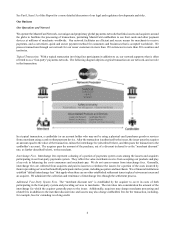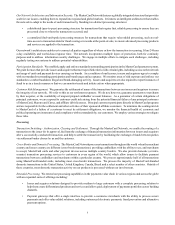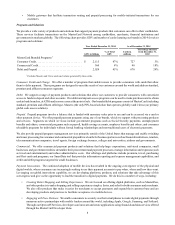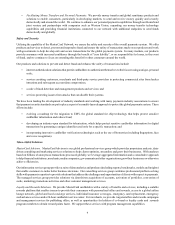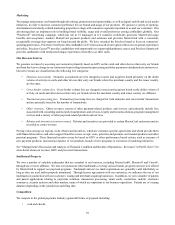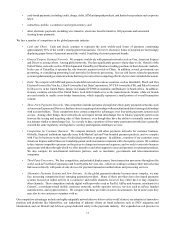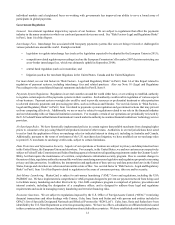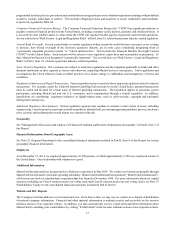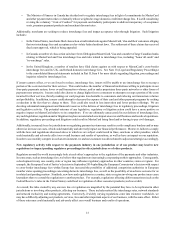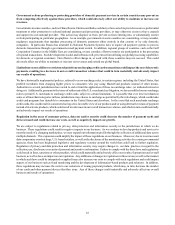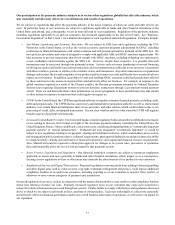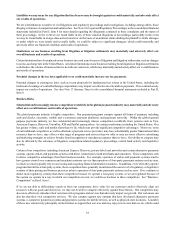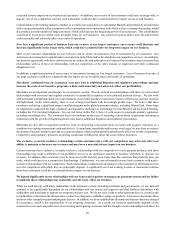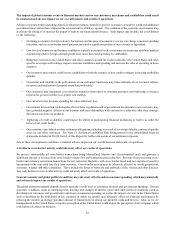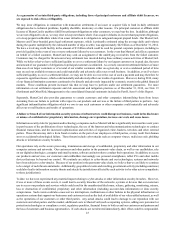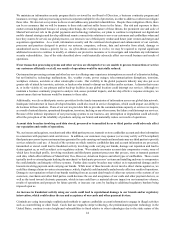MasterCard 2014 Annual Report Download - page 18
Download and view the complete annual report
Please find page 18 of the 2014 MasterCard annual report below. You can navigate through the pages in the report by either clicking on the pages listed below, or by using the keyword search tool below to find specific information within the annual report.16
Government actions preferring or protecting providers of domestic payment services in certain countries may prevent us
from competing effectively against those providers, which could adversely affect our ability to maintain or increase our
revenues.
Governments in some countries, such as China, Russia, Ukraine and India, could act (or have acted) to provide resources, preferential
treatment or other protection to selected national payment and processing providers, or may otherwise create (or have created)
and support its own national provider. This action may displace us from, prevent us from entering into, or substantially restrict
us from participating in, particular geographies. As an example, governments in some countries are considering, or may consider,
regulatory requirements that mandate processing of domestic payments either entirely in that country or by only domestic
companies. In particular, Russia has amended its National Payments Systems laws to require all payment systems to process
domestic transactions through a government-owned payment switch. In addition, regional groups of countries, such as the Gulf
Cooperation Countries in the Middle East, are considering, or may consider, efforts to restrict our participation in the processing
of regional transactions. Such developments would, and in Russia will, prevent us from utilizing our global processing capabilities
for domestic or regional customers. Our efforts to effect change in, or work with, these countries may not succeed. This could
adversely affect our ability to maintain or increase our revenues and extend our global brand.
Limitations on our ability to restrict merchants from surcharging credit card transactions could impact the use of electronic
payments, resulting in a decrease in our overall transaction volumes that could in turn materially and adversely impact
our results of operations.
We have historically implemented policies, referred to as no-surcharge rules, in certain regions, including the United States, that
prohibit merchants from charging higher prices to consumers who pay using MasterCard products instead of other means.
Authorities in several jurisdictions have acted to end or limit the application of these no-surcharge rules (or indicated interest in
doing so). Additionally, pursuant to the terms of settlement of the U.S. merchant class litigation, we have modified our no-surcharge
rules to permit U.S. merchants to surcharge credit cards, subject to certain limitations. It is possible that over time merchants in
some or all merchant categories in these jurisdictions may choose to surcharge as permitted by the rule change, which could make
credit card programs less desirable to consumers in the United States and elsewhere. In the event that such merchants surcharge
credit cards, this could result in consumers having a less favorable view of our products and/or using alternative means of payment
instead of electronic products, which could result in a decrease in our overall transaction volumes, and which in turn could materially
and adversely impact our results of operations.
Regulation in the areas of consumer privacy, data use and/or security could decrease the number of payment cards and
devices issued and could increase our costs, as well as negatively impact our growth.
We are subject to regulations related to privacy, data protection and information security in the jurisdictions in which we do
business. These regulations could result in negative impacts to our business. As we continue to develop products and services to
meet the needs of a changing marketplace, we may expand our information profile through the collection of additional data across
multiple channels. This expansion could amplify the impact of these regulations on our business. Moreover, due to recent account
data compromise events at large, U.S.-based retailers, as well as the disclosure of the monitoring activities by certain governmental
agencies, there has been heightened legislative and regulatory scrutiny around the world that could lead to further regulation.
Regulation of privacy and data protection and information security may require changes to our data practices in regard to the
collection, use, disclosure or security of personal and sensitive information. Failure to comply with the these laws and regulations
could result in fines, sanctions or other penalties, which could materially and adversely affect our results of operations and overall
business, as well as have an impact on our reputation. Any additions or changes to regulations in these areas (as well as the manner
in which such laws could be interpreted or applied) may also increase our costs to comply with such regulations and could impact
aspects of our business such as fraud monitoring and the development of information-based products and solutions. In addition,
these regulations may increase the costs to our customers of issuing payment products, which may, in turn, decrease the number
of our cards and other payment devices that they issue. Any of these changes could materially and adversely affect our overall
business and results of operations.


